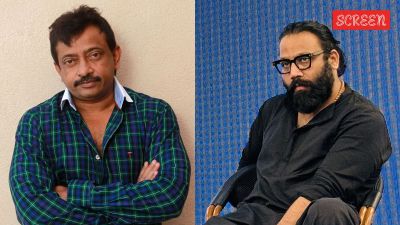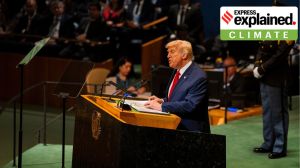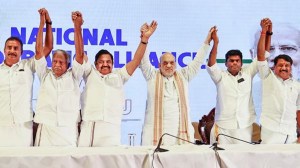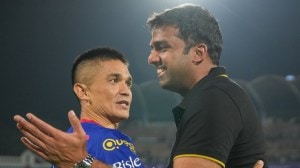Another prime minister, the same president
MAY 18, Washington: Prime Minister P.V. Narasimha Rao suggested a nuclear no first-use'' agreement to be followed by serious'' multila...

MAY 18, Washington: Prime Minister P.V. Narasimha Rao suggested a nuclear 8220;no first-use8221; agreement to be followed by 8220;serious8221; multilateral negotiations for total disarmament.
In his address to a joint session of the US Congress he said, 8220;I firmly believe that the way to ridding the world of weapons of mass destruction lies in creating a world order based on the universal principles of equality and non-discrimination as a means of enhancing security.8221;
8220;The answer that we as nations choose will shape the destiny of the world in the coming century,8221; Rao said.
He recalled how India and US had worked closely together in establishing an international consensus for banning nuclear weapons testing and halting production of fissile materials for nuclear weapons purposes, and said: 8220;To consolidate these gains further, meaningful steps should be taken towards denuclearisation which the international situation now allows.8221;
Referring to the spread of nuclear weapons in the last 50 years, Rao said the difficult and complex question of non-proliferation could be addressed effectively only when one considered their global reach, requiring similar global solutions. Every nation had the responsibility to its people to ensure their security.
He referred to the progress made toward forging an international consensus on banning nuclear weapons testing and halting the production of fissile material for nuclear weapons purposes and called for further meaningful steps to consolidate the gains through denuclearisation8230;pAT a joint press conference after an hour long meeting between Rao and Clinton, the US President said their differences remained as before but they had decided not to allow them to come in the way of their relations.
Rao, on his part, denied any kind of arm twisting by the president during their meeting. Amidst laughter, he stretched his arms and said: 8220;You can see, it is intact8221;
Clinton remarked: 8220;I am glad you said that,8221; and making it clear that US had no intentions of putting pressure on India, especially in areas involving its national security. It wanted to promote nuclear non-proliferation by enhancing the security of the concerned country and not by diminishing it, he added.
On the Kashmir issue, Clinton said, 8220;we have evidence that private parties are aiding and abetting militancy in the Valley.8221; 8220;Ultimately it is for India and Pakistan to sort out the Kashmir problem through dialogue,8221; he said.
Rao categorically denied that there were any human rights violations in the Kashmir Valley.
Asked about Israel possessing nuclear weapons, Clinton said Washington wanted to keep the nuclear club as small as possible, 8220;It is our endeavour to find out alternative security umbrellas for these nations,8221; he said.
8220;We have to find out what is pivotal for India8217;s security and work for that.8221; If Germany and Japan could find alternate security arrangements, 8220;I am sure other nations could also do so,8221; he said. At the outset, the President showered praises on India, describing it as the largest democracy of 900 million people with whom, he said, US hoped to forge a 8220;close relationship and strong partnership8221;. 8220;Both countries share concerns on many challenges that face the world today,8221; he said. He lauded India8217;s role in peace-keeping operations in Somalia, Cambodia and Mozambique.
The US Commerce Department had identified India as among the first 10 emerging markets. The American corporate world had shown considerable interest in the huge emerging Indian market, Clinton said8230;.
Excerpted from the Asian Recorder8217;, June 11-17, 1994
- 01
- 02
- 03
- 04
- 05































